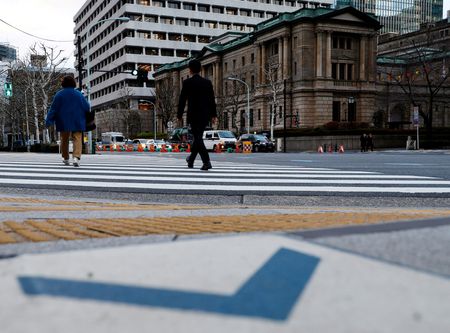By Leika Kihara
TOKYO (Reuters) – Japan’s dwindling working-age population is leading to structural changes in the labour market that are heightening pressure on firms to hike wages and services prices, the Bank of Japan said in two research papers released on Tuesday.
The findings back up the central bank’s argument that broadening inflationary pressures warrant raising interest rates steadily from current near-zero levels.
Permanent workers’ pay remained stagnant even as labour shortages intensified since the mid-2010s, as female and elderly workers filled the gap by taking on low-paid, part-time jobs.
The trend is changing as a dwindling pool of female and elderly workers, rising job hoppers and an increase in pay for part-time jobs prod firms to hike permanent workers’ pay, the BOJ said in a research paper on Japan’s labour market.
“Labour shortages are triggering changes in companies’ wage-setting behaviour,” the paper said. “Scope for additional labour supply is likely to gradually shrink, which is seen keeping upward pressure on wages.”
Such wage pressure is beginning to replace raw material costs as the main driver of inflation, the BOJ said in another research paper on Japan’s service-sector prices.
Services ranging from English lessons to tuition to massage have seen prices rise as labour costs continue to increase, the paper said.
“With wage pressure heightening, companies’ price-setting behaviour is changing” and propping up service-sector prices, which had hovered around zero since the late 1990s, it said.
The BOJ ended negative interest rates in March and hiked short-term borrowing costs to 0.25% in July on the view a solid economic recovery will keep inflation durably at its 2% target.
BOJ Governor Kazuo Ueda has said the central bank will keep raising interest rates if economic growth and inflation move in line with its projections.
(Reporting by Leika Kihara; Editing by Kim Coghill)





